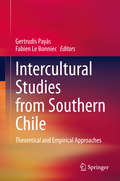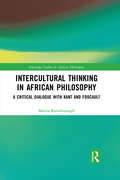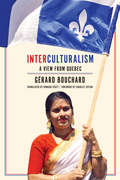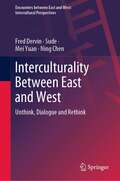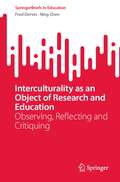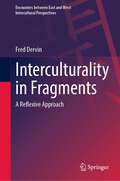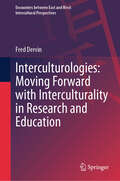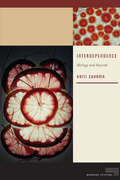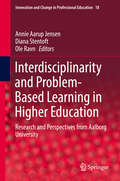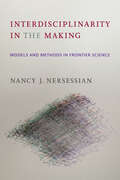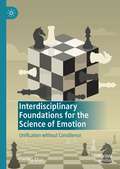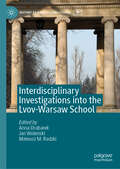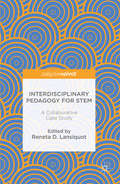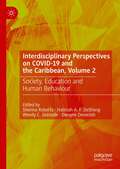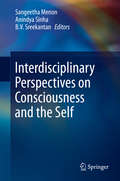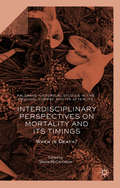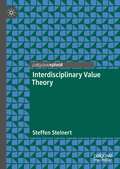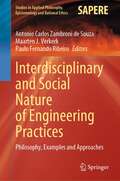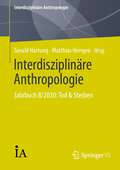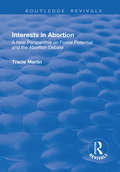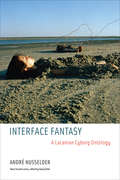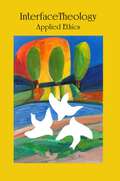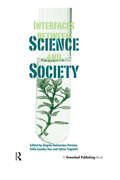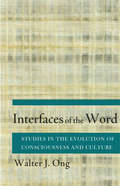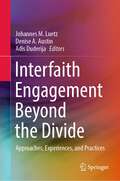- Table View
- List View
Intercultural Studies from Southern Chile: Theoretical and Empirical Approaches
by Gertrudis Payàs Fabien Le BonniecThis book presents a multidisciplinary overview of a little known interethnic conflict in the southernmost part of the Americas: the tensions between the Mapuche indigenous people and the settlers of European descent in the Araucania region, in southern Chile. Politically autonomous during the colonial period, the Mapuche had their land confiscated, their population decimated and the survivors displaced and relocated as marginalized and poor peasants by Chilean white settlers at the end of the nineteenth century, when Araucania was transformed in a multi-ethnic region marked by numerous tensions between the marginalized indigenous population and the dominant Chileans of European descent.This contributed volume presents a collection of papers which delve into some of the intercultural dilemmas posed by these complex interethnic relations. These papers were originally published in Spanish and French and provide a sample of the research activities of the Núcleo de Estudios Interétnicos e Interculturales (NEII) at the Universidad Católica de Temuco, in the capital of Araucania. The NEII research center brings together scholars from different fields: sociocultural anthropology, sociolinguistics, ethno-literature, intercultural education, intercultural philosophy, ethno-history and translation studies to produce innovative research in intercultural and interethnic relations. The chapters in this volume present a sample of this work, focusing on three main topics: The ambivalence between the inclusion and exclusion of indigenous peoples in processes of nation-building.The challenges posed by the incorporation of intercultural practices in the spheres of language, education and justice.The limitations of a functional notion of interculturality based on eurocentric thought and neoliberal economic rationality. Intercultural Studies from Southern Chile: Theoretical and Empirical Approaches will be of interest to anthropologists, linguists, historians, philosophers, educators and a range of other social scientists interested in intercultural and interethnic studies.
Intercultural Thinking in African Philosophy: A Critical Dialogue with Kant and Foucault (Routledge Studies in African Philosophy)
by Marita RainsboroughThis book sets up a rich intercultural dialogue between the philosophy of Immanuel Kant and Michel Foucault, and that of key African thinkers such as Kwame Anthony Appiah, Achille Mbembe, Kwasi Wiredu, Kwame Gyekye, Tsenay Serequeberhahn, and Henry Odera Oruka.The book challenges western-centric visions of an African future by demonstrating the richness of thought that can be found in African and Afrodiasporic philosophy. The book shows how thinkers such as Serequeberhan have criticised the inconsistencies in Kant’s work, whereas others such as Wiredu, Gyekye, Appiah and Mbembe have referenced his work more positively and developed progressive political concepts such as the metanational state; partial cosmopolitanism and Afropolitanism. The book goes on to consider how Mbembe and Mudimbe have responded to Foucault’s ideas in deciphering the various Western, African and Afrodiasporic discourses of knowledge on Africa. The book concludes by considering various theories of intercultural exchange, from Gyekye’s cultural borrowing, to Appiah’s conversation across boundaries, Wiredu’s cross cultural dialogue, Mbembe’s thinking outside the frame, Serequeberhan’s dialogue at a distance, and Oruka’s call for global re-distribution and a new ecophilosophical attitude to safeguard human existence on the planet.This book invites us all to engage in intercultural dialogue and mutual respect for different cultural creations. It will be an important read for researchers in Philosophy wherever they are in the world.
Interculturalism
by Charles Taylor Howard Scott Gerard BouchardAccommodating ethnic diversity is a major challenge for all democratic nations and a topic that has attracted a great deal of attention in the last few decades. Within Quebec, a new approach has emerged that seeks a balance between the needs of minorities and those of the majority.In Interculturalism, sociologist and historian Gérard Bouchard presents his vision of interculturalism as a model for the management of diversity. A pluralist approach which recognizes the existence of a cultural majority whose rights must also be acknowledged, interculturalism constitutes an important alternative to multiculturalism both in Canada and internationally. Written by one of Quebec's leading public intellectuals and the co-chair of the Bouchard-Taylor Commission on reasonable accommodation, Interculturalism is the first clear and comprehensive statement in English of an approach being discussed around the world.A translation of Bouchard's award-winning French-language work, L'Interculturalisme: Un point de vue québécois, this book features a new foreword by philosopher Charles Taylor and an afterword by the author written specifically for the English-language edition.
Interculturality Between East and West: Unthink, Dialogue and Rethink (Encounters between East and West)
by Fred Dervin Sude Mei Yuan Ning ChenThis book urges readers to develop a radical capacity to unthink and rethink interculturality, through multiple, pluri-perspectival and honest dialogues between the authors, and their students. This book does not give interculturality a normative scaffolding but envisages it differently by identifying some of its polyphonic textures. China’s rich engagement with interculturality serves to support the importance of being curious about other ways of thinking about the notion beyond the ‘West’ only. As such, the issues of culture, identity, language, translation, intercultural competence and silent transformations (amongst others) are re-evaluated in a different light. This is a highly informative and carefully presented book, providing scientific insights for readers with an interest in interculturality.
Interculturality as an Object of Research and Education: Observing, Reflecting and Critiquing (SpringerBriefs in Education)
by Fred Dervin Ning ChenThis book proposes a new method for working on the complex and polysemic notion of interculturality, aimed at scholars, students and educators who have an interest in enriching and challenging their own take on this somewhat controversial scientific notion. Multiple examples of observability made by the authors are provided to illustrate the method. The book helps readers to look at themselves as ‘producers’, ‘consumers’ and ‘promoters’ of selected knowledge of interculturality. This book represents an original contribution to the field, by introducing the importance of observation and reflexivity in building up varied epistemic engagements with the notion of interculturality.
Interculturality in Fragments: A Reflexive Approach (Encounters between East and West)
by Fred DervinThis book continues the author’s long-term reflections (over 20 years of scholarship and experience in intercultural communication education) around the fascinating and yet contestable notion of interculturality in education. As an unstable and polysemic notion, interculturality deserves to be opened up again and again and there is a need to engage with it continuously, observing, critiquing and problematizing its complexities. This book urges researchers, students and interculturalists to take the time to think carefully and deeply about interculturality and to find inspiration beyond the dominating ‘Western’ ideological world of intercultural research and education. This book starts from short fragments written by the author for himself over a period of one year. In these short statements and notes about interculturality, the author reflects creatively on the questions he had in mind at the time of writing and offers some (temporary) answers, which, in turn, are questioned and revised. Over the 1000 fragments that the author wrote, he selected about 100, for which he wrote commentaries, referring to and reviewing current research and debates on interculturality in the process. One of the specificities of the book is to be highly multidisciplinary to help us get used to looking for inspiration in other fields of research and creativity. The fragments can be read randomly – the reader may open the book at any page and pick any fragment. The author suggests reading each individual fragment first and then the accompanying explanatory texts. While reading them, the reader is also invited to reflect on any potential addition to what the author wrote – anything they might dis-/agree with, anything they would have wanted to discuss with the author. Questions have been added at the end of each chapter for readers to reflect on and to enrich their own criticality and reflexivity. The book serves as continuous guidance for engaging with interculturality.
Interculturologies: Moving Forward with Interculturality in Research and Education (Encounters between East and West)
by Fred DervinThis book showcases 100 terms related to the scientific, educational and political notion of interculturality. Each term is presented with its specific multilingual discussions, scientific origins, multifaceted content, and short reviews of the global literature in English. Some myths, imaginaries and ideologies (‘interculturologies’ in the book) that they have led to construct are also introduced. Questions at the end of each entry encourage readers to think further regarding the notion of interculturality in research and education. Based on the author's decades-long experience in researching and teaching in the interdisciplinary field of intercultural communication education in different parts of the world, his constant reflexive and critical engagement with the notion of interculturality, and in-depth reviews of current research, the author has carefully selected (recurrent) concepts, notions, and ideas to be deconstructed in order to challenge readers to think further with him, especially beyond ‘Western’ and certain static and resistant ideological positions. These represent a complex body of concepts and notions, but also involve myths and imaginaries that can prevent us from moving forward in our thinking and in acting interculturally in research and education. This book serves as a reading guide for further interculturologies that the reader might identify in the future or as they engage with the book.
Interdependence: Biology and Beyond (Meaning Systems)
by Kriti SharmaFrom biology to economics to information theory, the theme of interdependence is in the air, framing our experiences of all sorts of everyday phenomena. Indeed, the network may be the ascendant metaphor of our time. Yet precisely because the language of interdependence has become so commonplace as to be almost banal, we miss some of its most surprising and far-reaching implications.In Interdependence, biologist Kriti Sharma offers a compelling alternative to the popular view that interdependence simply means independent things interacting. Sharma systematically shows how interdependence entails the mutual constitution of one thing by another—how all things come into being only in a system of dependence on others.In a step-by-step account filled with vivid examples, Sharma shows how a coherent view of interdependence can help make sense not only of a range of everyday experiences but also of the most basic functions of living cells. With particular attention to the fundamental biological problem of how cells pick up signals from their surroundings, Sharma shows that only an account which replaces the perspective of “individual cells interacting with external environments” with one centered in interdependent, recursive systems can adequately account for how life works.This book will be of interest to biologists and philosophers, to theorists of science, of systems, and of cybernetics, and to anyone curious about how life works. Clear, concise, and insightful, Interdependence: Biology and Beyond explicitly offers a coherent and practical philosophy of interdependence and will help shape what interdependence comes to mean in the twenty-first century.
Interdisciplinarity and Problem-Based Learning in Higher Education: Research and Perspectives from Aalborg University (Innovation and Change in Professional Education #18)
by Ole Ravn Annie Aarup Jensen Diana StentoftThis book addresses the relation between Problem-Based Learning (PBL) and interdisciplinarity and challenges the often implicit assumption that PBL leads to interdisciplinarity by default. The book examines theoretical and philosophical aspects of PBL and interdisciplinary learning. The first part of the book conceptualises the notions of problem-based learning and interdisciplinary learning, and highlights some key overlaps and ways of conceiving of their interrelatedness. It discusses the role of problem-based medical education in relation to interdisciplinary professionalism in medical education. Taking the reader into the realm of techno-anthropology, the book discusses the role of problems and projects in transgressing disciplines, and presents an analysis of three challenges facing new students when entering interdisciplinary and problem-based higher education. The second part of the book focuses on practicing interdisciplinarity in problem-based higher education. It explores how the construction of problems in interdisciplinary PBL projects can be seen from the perspectives of multicultural groups, and examines group processes in interdisciplinary PBL projects. It concludes by taking a closer look at student practices in interdisciplinary PBL, and at how students are positioned and position themselves in the complex transdisciplinary PBL project.
Interdisciplinarity in the Making: Models and Methods in Frontier Science
by Nancy J. NersessianA cognitive ethnography of how bioengineering scientists create innovative modeling methods.In this first full-scale, long-term cognitive ethnography by a philosopher of science, Nancy J. Nersessian offers an account of how scientists at the interdisciplinary frontiers of bioengineering create novel problem-solving methods. Bioengineering scientists model complex dynamical biological systems using concepts, methods, materials, and other resources drawn primarily from engineering. They aim to understand these systems sufficiently to control or intervene in them. What Nersessian examines here is how cutting-edge bioengineering scientists integrate the cognitive, social, material, and cultural dimensions of practice. Her findings and conclusions have broad implications for researchers in philosophy, science studies, cognitive science, and interdisciplinary studies, as well as scientists, educators, policy makers, and funding agencies. In studying the epistemic practices of scientists, Nersessian pushes the boundaries of the philosophy of science and cognitive science into areas not ventured before. She recounts a decades-long, wide-ranging, and richly detailed investigation of the innovative interdisciplinary modeling practices of bioengineering researchers in four university laboratories. She argues and demonstrates that the methods of cognitive ethnography and qualitative data analysis, placed in the framework of distributed cognition, provide the tools for a philosophical analysis of how scientific discoveries arise from complex systems in which the cognitive, social, material, and cultural dimensions of problem-solving are integrated into the epistemic practices of scientists. Specifically, she looks at how interdisciplinary environments shape problem-solving. Although Nersessian&’s case material is drawn from the bioengineering sciences, her analytic framework and methodological approach are directly applicable to scientific research in a broader, more general sense, as well.
Interdisciplinary Foundations for the Science of Emotion: Unification without Consilience
by Cecilea MunIn this book, Cecilea Mun introduces an innovative meta-framework for conducting interdisciplinary research in the science of emotion, broadly construed, as well as a framework for a particular kind of theory of emotion. She provides new solutions and arguments in support of an embodied cognitive approach to resolving a wide range of problems, including those concerning skepticism, the place of ordinary intuitions for the science of emotion, intentionality, the rationality of emotions, naturalizing knowledge, and the debate between philosophical cognitive and noncognitive theories of emotion. Her solutions include a revolutionary, unifying, interdisciplinary taxonomy of theories of emotion, which allows one to understand the discourse in the science of emotion as a debate between four fundamental types of theories: realism, instrumentalism, eliminativism, and eliminative-realism. Her original proposal for a conception of intentionality that makes sense of our ordinary intuitions is also combined with her comprehensive account of rationality to articulate a groundbreaking understanding of the structure of human rationality. All of the contributions made herein, together, provide the foundations for a profound understanding of emotions, including as a kind of embodied language.
Interdisciplinary Investigations into the Lvov-Warsaw School (History of Analytic Philosophy)
by Jan Woleński Anna Drabarek Mateusz M. RadzkiThis book presents the heritage of the Lvov-Warsaw School from both the historical and the philosophical perspective. The historical view focuses on the beginnings and the dramatic end of the School brought about by the outbreak of World War II. The philosophical view, on the other hand, encompasses a broad spectrum of issues, including logical, epistemological, axiological, and psychological problems, revealing the interdisciplinary nature of studies carried out by Kazimierz Twardowski and his students.With thirteen diverse and original essays this volume is split into three parts: History, Culture and Axiology; Psychology; and Logic and Methodology. Exploring not only the history of philosophy represented by the Lvov-Warsaw school, the book also reflects on the condition of contemporary philosophy from the perspective of concepts developed by its representatives. Furthermore, the studies presented in this book delve into problems of contemporary science and its distinctive interdisciplinary character. This volume is, therefore, not only a collection of analyses of the Lvov-Warsaw School philosophy, but also an investigation into the interdisciplinarity of science and philosophy itself.
Interdisciplinary Pedagogy for STEM
by Reneta D. LansiquotThis book focuses on constructivist theory and collaborative interdisciplinary studies, showing how constructivist theory complements interdisciplinary studies. Constructivist theory stresses how learners construct new ideas and concepts, while the interdisciplinary method requires that learners approach complex problems from multiple perspectives. The author uses the New York City College of Technology as a model to demonstrate how learning can be embedded in complex, realistic, and relevant environments. As a result, students learn to consider significant issues from a variety of viewpoints and thus negotiate their social landscape. In approaching problems that they recognize as meaningful, they take ownership of their learning and become increasingly self-aware. This scholarly book makes a theoretical contribution to its field while also offering a practical, real world example of how to successfully integrate a curriculum.
Interdisciplinary Perspectives on COVID-19 and the Caribbean, Volume 2: Society, Education and Human Behaviour
by Sherma Roberts Halimah A. F. DeShong Wendy C. Grenade Dwayne DevonishCaribbean countries have had to navigate multiple crises, which have tested their collective resolve through time. In this regard, the region’s landscape has been shaped by an interplay of vulnerability and resilience which has brought to the fore possibilities and contradictions. It is within this context that the effects of the COVID-19 pandemic must be considered. Interdisciplinary Perspectives on COVID-19 and the Caribbean, Volume 2: Society, Education and Human Behaviour provides a comprehensive, multi- and interdisciplinary assessment of the impact of the COVID-19 pandemic, using the Caribbean as the site of enquiry. The edited collection mobilises critical perspectives brought to bear on research produced within and beyond the boundaries and boundedness of conventional academic disciplinary divides, in response to the multi-dimensional crises of our time. This volume is divided into four (4) parts consisting of twenty-three (23) chapters and weaves together four broad thematic strands: COVID-19 and Caribbean Society; COVID-19 Religion and Rights; Psycho-social Impacts of COVID-19; and Education, Innovation, and Technology. Authors working within and across the human, social, physical and life sciences consider the myriad effects of the health crisis in the region, interrogating these experiences from the granular to macro level, utilising inter and multidisciplinary lenses. Collectively, the chapters which constitute Volume II expose the fault lines in Caribbean societies, which are deeply rooted in the region’s history and delineate the precise ways in which the pandemic has transformed lives and livelihoods in the region. The culmination of this collection offers a reimagining of our Caribbean contemporary futures in the hope of finding home-grown solutions, avenues and possibilities.
Interdisciplinary Perspectives on Consciousness and the Self
by Anindya Sinha Sangeetha Menon B. V. SreekantanThis book brings together ancient spiritual wisdom and modern science and philosophy to address age-old questions regarding our existence, free will and the nature of conscious awareness. Stuart Hameroff MD Professor, Anesthesiology and Psychology, and Director, Center for Consciousness Studies The University of Arizona, Tucson, Arizona This book presents a rich, broad-ranging overview of contemporary research and scholarship into consciousness and the self. . . . It is . . . to their credit that the editors have assembled a highly stimulating set of scholars whose expertise cover all the relevant areas. I strongly recommend the book to anyone with an interest in understanding the directions in which contemporary thinking about the nature of consciousness is headed. B. Les Lancaster Emeritus Professor of Transpersonal Psychology Liverpool John Moores University, UK This volume is a collection of 23 essays that contribute to the emerging discipline of consciousness studies with particular focus on the concept of the self. The essays together argue that to understand consciousness is to understand the self that beholds consciousness. Two broad issues are addressed in the volume: the place of the self in the lives of humans and nonhuman primates; and the interrelations between the self and consciousness, which contribute to the understanding of cognitive functions, awareness, free will, nature of reality, and the complex experiential and behavioural attributes of consciousness. The book presents cutting-edge and original work from well-known authors and scholars of philosophy, psychiatry, behavioural sciences and physics. This is a pioneering attempt to present to the reader multiple ways of conceptualizing and thus understanding the relation between consciousness and self in a nuanced manner.
Interdisciplinary Perspectives on Mortality and its Timings: When is Death? (Palgrave Historical Studies in the Criminal Corpse and its Afterlife)
by Shane MccorristineThis book is open access under a CC BY 4.0 license.This volume provides a series of illuminating perspectives on the timings of death, through in-depth studies of Shakespearean tragedy, criminal execution, embalming practices, fears of premature burial, rumours of Adolf Hitler’s survival, and the legal concept of brain death. In doing so, it explores a number of questions, including: how do we know if someone is dead or not? What do people experience at the moment when they die? Is death simply a biological event that comes about in temporal stages of decomposition, or is it a social event defined through cultures, practices, and commemorations? In other words, when exactly is death? Taken together, these contributions explore how death emerges in a series of stages that are uncertain, paradoxical, and socially contested.
Interdisciplinary Value Theory
by Steffen SteinertThis book offers an interdisciplinary introduction to value theory. It reviews how researchers in four academic disciplines – psychology, sociology, anthropology, and philosophy – understand value and value change. It offers an introduction for researchers in these disciplines about how other disciplines define, theorize, and investigate value(s) to foster interdisciplinary communication.The book identifies and summarizes similarities and differences of value theory between the academic disciplines and highlights promising areas where each discipline can learn from the others.
Interdisciplinary and Social Nature of Engineering Practices: Philosophy, Examples and Approaches (Studies in Applied Philosophy, Epistemology and Rational Ethics #61)
by Paulo Fernando Ribeiro Antonio Carlos Zambroni de Souza Maarten J. VerkerkThis book covers practical and philosophical aspects of Engineering, paying special attention to the social impacts of emerging technologies. Some fundamentals of philosophy of technology are introduced followed by social, economic, and environmental discussion and implications in different disciplines. Each chapter provides insights on the responsibilities involved in the design of engineering projects. The examples presented combine concepts about the impacts of Engineering in society at the same time that incorporates new technological models, yielding an innovative approach about the topics.
Interdisziplinäre Anthropologie: Jahrbuch 8/2020: Tod & Sterben (Interdisziplinäre Anthropologie)
by Matthias Herrgen Gerald HartungDas Jahrbuch nimmt mit „Tod und Sterben“ ein zentrales Thema des anthropologischen Diskurses auf: Die Abkehr von religiösen Weltdeutungen und die zunehmende Individualisierung und Flexibilisierung vieler Lebensbereiche prägen nicht nur gesellschaftliche Einstellungen zum Tod und zum Sterben; auch die konkreten Praxen, wie heute gestorben und wie der Toten gedacht wird, haben sich gewandelt und zu einer Pluralisierung von Todesbildern geführt. Wo vormals tradierte Riten den Umgang mit Sterben und Tod strukturierten, stehen den Einzelnen gegenwärtig unterschiedlichste Formen der „Gestaltung“ des (eigenen) Sterbens, der Bestattung und des Andenkens zur Wahl. Der Diskurs mit dem Leitartikel „Tod und Sterben. Anthropologisch-praktische Überlegungen“ eröffnet eine Debatte, die facettenreich Beiträge zu einer modernen Thanatologie zusammenträgt. Die Kommentare & Replik zeigen sehr eindringlich den pragmatistischen Charakter des interdisziplinären Projektes des Jahrbuchs, das mit einer Position zum Verhältnis von Anthropologie und Ethik einen normativen Beitrag zum Schwerpunkthema leistet.
Interests in Abortion: A New Perspective on Foetal Potential and the Abortion Debate (Routledge Revivals)
by Tracie MartinThis title was first published 2000: Ever since Michael Tooley published his article on "Abortion and Infanticide" in 1972, the abortion debate has revolved around questions such as: "What is a person?"; "What is it that gives persons the right to life?"; and "Is it wrong to kill potential persons?" This study defends a position that accepts elements from both the liberal and conservative tradition. Following Tooley, Tracie Martin understands personhood in terms of psychological states and agrees that early foetuses who lack the relevant mental states are not persons. While this might seem a victory for the liberal tradition, Martin then goes on to provide an empirically-based argument for the view that by 24-weeks gestation foetuses have acquired the relevant characteristics that provide strong grounds for thinking that it is directly wrong to kill such foetuses.
Interface Fantasy: A Lacanian Cyborg Ontology (Short Circuits)
by Andre NusselderBehind our computer screens we are all cyborgs: through fantasy we can understand our involvement in virtual worlds.Cyberspace is first and foremost a mental space. Therefore we need to take a psychological approach to understand our experiences in it. In Interface Fantasy, André Nusselder uses the core psychoanalytic notion of fantasy to examine our relationship to computers and digital technology. Lacanian psychoanalysis considers fantasy to be an indispensable “screen” for our interaction with the outside world; Nusselder argues that, at the mental level, computer screens and other human-computer interfaces incorporate this function of fantasy: they mediate the real and the virtual. Interface Fantasy illuminates our attachment to new media: why we love our devices; why we are fascinated by the images on their screens; and how it is possible that virtual images can provide physical pleasure. Nusselder puts such phenomena as avatars, role playing, cybersex, computer psychotherapy, and Internet addiction in the context of established psychoanalytic theory. The virtual identities we assume in virtual worlds, exemplified best by avatars consisting of both realistic and symbolic self-representations, illustrate the three orders that Lacan uses to analyze human reality: the imaginary, the symbolic, and the real. Nusselder analyzes our most intimate involvement with information technology—the almost invisible, affective aspects of technology that have the greatest impact on our lives. Interface Fantasy lays the foundation for a new way of thinking that acknowledges the pivotal role of the screen in the current world of information. And it gives an intelligible overview of basic Lacanian principles (including fantasy, language, the virtual, the real, embodiment, and enjoyment) that shows their enormous relevance for understanding the current state of media technology.
Interface Theology: Applied Ethics
by Atf PressInterface Theology is a biannual refereed journal of theology published in print, epub and open access by ATF Press in Australia. The journal is a scholarly ecumenical and interdisciplinary publication, aiming to serve the church and its mission.
Interfaces between Science and Society
by Ângela Guimarães Pereira Sofia Guedes Vaz Sylvia TognettiThe project of science has been to provide answers to questions about the world and how it works. Often, this lofty role has been characterised by a narrow and dogmatic scientific training, an unwillingness to communicate to differing stakeholder needs, a refusal to accept and to manage uncertainty, complexity and value commitments, and the reduction of knowledge assessment to colleague peer review on narrowly technical issues. Times have changed. As the world faces increasingly disparate challenges, science is subjected to increasingly vehement demands from a society calling for transparency, openness and public participation in science policy. Science is going through an evolutionary process. Perhaps the most painful process it has ever encountered. Research on the interfaces between science and society is a burgeoning area. A new conception of knowledge now appears to be emerging, based on the awareness of complexity, uncertainty and a plurality of legitimate perspectives and interests. Democracy is extending into the previously quite exclusive scientific realm, and science must now submit to public scrutiny and participation in the governance of knowledge. This book provides much-needed reflections on the methods and tools for knowledge quality assurance, particularly on its inputs to extended policy and decision-making processes. The overall aim is to improve the relationship between science and society. The discussion involves six themes: communicating between plural perspectives; accepting and learning how to manage uncertainty, complexity and value commitments; acknowledging new conceptions of knowledge; implementing transparency, openness and participation in science policy; valuing community-based research; and exploring how new ICT can support inclusive governance. Taken together, these themes provide both a framework and vision on how to conceive, discuss and evaluate the changes that are occurring. The chapters cover theory, practice, approaches, experiences, ideas and suggestions for a move beyond "talking the talk" to "walking the walk". Science and policy interfaces are dynamic processes needing to permanently redefine themselves and their roles. This book contributes to the enrichment and deepening of our understanding of these important new trends in the social relations of science, which are fundamental to our understanding of the prospects for further progress. The book will be essential reading for scientists, policy-makers, managers and the public.
Interfaces of the Word: Studies in the Evolution of Consciousness and Culture
by Walter J. OngIn Interfaces of the World, Walter J. Ong explores the effects on consciousness of the word as it moves through oral to written to print and electronic culture.
Interfaith Engagement Beyond the Divide: Approaches, Experiences, and Practices
by Adis Duderija Johannes M. Luetz Denise A. AustinThis book features reflections by scholars and practitioners from diverse religious traditions. It posits that the global challenges facing humanity today can only be mastered if humans from diverse faith traditions can meaningfully collaborate in support of human rights, reconciliation, sustainability, justice, and peace. Seeking to redress common distortions of religious mis- and dis-information, the book aims to construct interreligious common ground ‘beyond the divide’.Organised into three main sections, the book features sixteen conceptual, empirical, and practice-informed chapters that explore spirituality across faiths and cultures. Chapter 1 delineates the state of the art in relation to interfaith engagement, Chapters 2–8 advance theoretical research, Chapters 9–12 discuss empirical perspectives, and Chapters 13–16 showcase field projects and recount stories and lived experiences.Comprising works by scholars, professionals, and practitioners from around the globe, Interfaith Engagement Beyond the Divide: Approaches, Experiences, and Practices is an interdisciplinary publication on interreligious thought and engagement:Assembles a curated collection of chapters from numerous countries and diverse religious traditions;Addresses interfaith scholarship and praxis from a range of interdisciplinary perspectives;Comprises interfaith dialogue and collaborative research involving authors of different faiths;Envisions prospects for peace, interreligious harmony in diversity, and a world that may be equitably and enduringly shared.The appraisal of present and future challenges and opportunities, framed within a context of public policy and praxis, makes this interdisciplinary publication a useful tool for teaching, research, and policy development. Chapter 16 is available open access under a Creative Commons Attribution 4.0 International License via link.springer.com.
